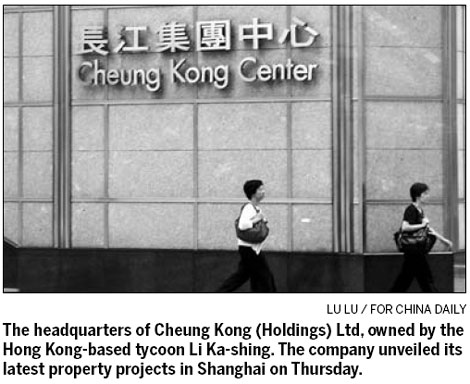Cheung Kong unveils development plans for three projects in Shanghai

SHANGHAI -Cheung Kong (Holdings) Ltd unveiled its latest development plans in Shanghai on Thursday. Analysts said the current purchasing restrictions on residential properties won't shake cash-rich companies and China's solid economic growth will ensure long-term investment in the property market.
Hong Kong-listed Cheung Kong, chaired by the tycoon Li Ka-shing, announced developments in three projects in Shanghai.
Upper West Shanghai in the Putuo district, will become an international standard commercial complex. The Oriental Financial Center in the Lujiazui Finance and Trade Zone in Pudong New Area, has been designed as a Grade A office building. Meanwhile, a project in the Jiading district will be a high-end residential complex.
"The decision indicates Cheung Kong's optimism about the market over the next two to three years," said Joe Zhou, a local director with the real estate consultancy Jones Lang LaSalle in Shanghai.
Cheung Kong bought the three plots several years ago and the company is now ready to develop them in terms of cash and planning, said Regina Yang, director of research and consultancy at Knight Frank, a global property consultancy company.
"The Putuo plot is located in what will become the Putuo district's new commercial center by 2015. Meanwhile, the site at Lujiazui will be situated at a transport hub, with access to four metro lines in the future," Yang said.
The fundamentals of the property market remain strong and although the residential market may be going through a slow patch at the moment, the mid- to long-term prospects remain good. "The new developments will take three to five years to complete, by which time the sentiment in the market is likely to be very different," said James Macdonald, head of Savills China research.
The development of commercial complexes is the trend of the future.
Not only will the different types of properties bring businesses closer together, but will also avoid a traditional weakness of office areas by attracting customers during their leisure time, said Yang.
Since 2010, multinational corporations have become major lessees of offices, and their expansion demand will continue to rise in the next two to three years, said Zhou.
"Since bottoming out in the third quarter of 2009, the average rent for Grade A offices in the city has soared 34 percent between the fourth quarter of 2009 and the second quarter this year," he added.
Zhou also predicted a bright future for the retail sector. He said that another advantageous factor is that average national incomes and consumption will continue to rise at an annual growth rate of 10 percent, which will guarantee substantial returns from retail businesses across the country.
"High-end residential property plays an important role as investment, especially as inflation continues to be major concern," said Albert Lau, managing director of Savills China.
Although residential property transactions in major cities have recently hit a bottom, the performance of major domestic residential property developers across the nation in the first six months has been "quite outstanding," according to a report released in early July by China Real Estate Information Corp.
The nation's top 10 property developers generated combined revenue of 332.3 billion yuan ($51.45 billion) in the first half of this year, up more than 80 percent over the same period in 2010. The report says that indicates that the major players are bucking the trend and consolidating their market dominance.
China Daily
(China Daily 07/15/2011 page14)


















